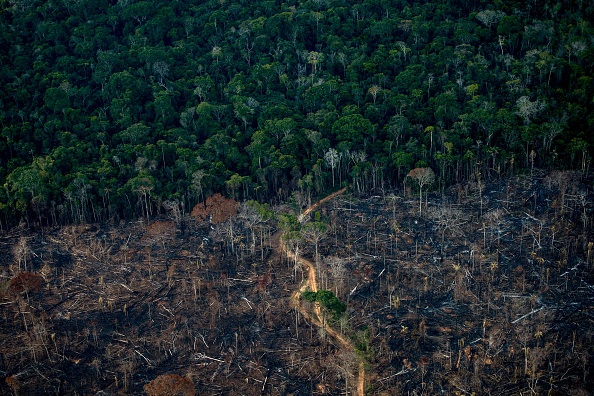Companies Urged to Take Stock of Their Impact on Nature and Related Risks
A U.N.-funded task force aims to help businesses report and act on a variety of issues, including deforestation and overfarming
Companies should consider the natural world as core to their business and report their effect on it in much more detail, according to a U.N.-funded group that promotes sustainable business practices. But assessing environmental impact remains tricky.
The latest draft framework published by the Taskforce on Nature-Related Financial Disclosures aims to help big businesses and financial institutions report and act on nature-related risks, covering issues including deforestation, pollution, water stress and overfarming. It follows previous drafts, with a final version slated to be published in September.
Depletion of resources and damage to rivers and forests should be seen as integral to firms’ operations, and not merely a matter of corporate responsibility, said Tony Goldner, the TNFD’s executive director. “We used to think of nature as an endless supplier of resources into our business practices,” he said. “We’re trying to shift the conversation around the nature of the relationship between nature and business.”
The final framework should give priority to the end result in natural areas, said Kat Bruce, founder and director of environmental-DNA startup NatureMetrics.
“Creating a baseline on the state of nature in…priority areas and then ongoing monitoring to track progress over time is key,” she said, noting that new technology allowed for collection of much more solid biodiversity data.
“We also need to focus on how effective company actions are to mitigate risks,” Ms. Bruce said. The current guidance is a “solid step,” she said. “But we must not stop there.”
The TNFD is a market-led initiative but funded by the United Nations. It brings together 40 corporate executives, including Deputy Environment Director Alexandre Capelli of French luxury-goods group LVMH Moët Hennessy Louis Vuitton SE; GSK PLC head of corporate responsibility Sarah Dyson; Renata Pollini, head of nature at Swiss cement maker Holcim Ltd.; and Koushik Chatterjee, chief financial officer at India’s Tata Steel Ltd.
Some $44 trillion of global economic value is moderately or highly dependent on nature, according to the World Economic Forum. The collapse of natural systems could wipe $2.7 trillion a year from the global economy by 2030, according to the World Bank.
Companies and shareholders should pay more attention to the material risk of natural degradation, Mr. Goldner said. “Dependency is the pathway to risk,” he said. “If you’re investing in a fast-growing agricultural company in an area where there is water stress, that should trigger questions,” he said.
“What does that tell the investor about the ability to keep growing at that same rate?”
The draft framework covers three areas that should be assessed by large companies and financial institutions: the use of land, freshwater and oceans; pollution and pollution removal; and resource use and replenishment. The framework highlights the potential use of bidirectional metrics, that is to say, positive effects as well as negative, Mr. Goldner said.
A fourth indicator, on climate change, is covered by a separate framework set out by the Taskforce on Climate-Related Financial Disclosures, or TCFD.
Companies’ effect on climate change is relatively simple to measure. Emissions can be calculated in metric tons, and companies use shared rules that enable comparisons between one business and another, even if reporting remains patchy and partly based on estimates.
But reaching “nature positive”—as the TNFD aims to achieve—is a more nebulous concept, Mr. Goldner acknowledged. “There’s some work to do reaching a consensus on what nature positive looks like,” he said. It would likely encompass a basket of metrics, rather than a single indicator, he added.
The TNFD’s draft comes after nations agreed on a new international framework that will oblige large corporations to show they are reducing their impact on the world’s natural life.
Public subsidies seen as harmful for biodiversity will be cut by $500 billion a year under the Global Biodiversity Framework, or GBF, reached at the United Nations’ COP15 conference on biodiversity in Montreal in December.
Under the GBF, governments between now and 2030 will introduce laws and policy measures requiring large companies to disclose and reduce the damage done to ecosystems from their operations, supply chains and portfolios. They will also be required to provide information to the public needed for more sustainable consumption.
A previous draft requirement for businesses to reduce their negative impact on the environment by at least half wasn’t included in the final agreement, which doesn’t specify the extent of the required actions. Nearly 200 countries signed on to the final agreement. The U.S. wasn’t an official participant.
The TNFD’s framework aims to help businesses align their reporting and actions to global policy goals, such as the GBF, the task force said. The draft framework includes sector-specific guidance for areas including agriculture, mining, energy and financial services.
Guidance for other industries, including textiles, will be released on a rolling basis over the coming months, the TNFD said.
 Copyright 2020, Dow Jones & Company, Inc. All Rights Reserved Worldwide. LEARN MORE
Copyright 2020, Dow Jones & Company, Inc. All Rights Reserved Worldwide. LEARN MORE
This stylish family home combines a classic palette and finishes with a flexible floorplan
Just 55 minutes from Sydney, make this your creative getaway located in the majestic Hawkesbury region.
Continued stagflation and cost of living pressures are causing couples to think twice about starting a family, new data has revealed, with long term impacts expected
Australia is in the midst of a ‘baby recession’ with preliminary estimates showing the number of births in 2023 fell by more than four percent to the lowest level since 2006, according to KPMG. The consultancy firm says this reflects the impact of cost-of-living pressures on the feasibility of younger Australians starting a family.
KPMG estimates that 289,100 babies were born in 2023. This compares to 300,684 babies in 2022 and 309,996 in 2021, according to the Australian Bureau of Statistics (ABS). KPMG urban economist Terry Rawnsley said weak economic growth often leads to a reduced number of births. In 2023, ABS data shows gross domestic product (GDP) fell to 1.5 percent. Despite the population growing by 2.5 percent in 2023, GDP on a per capita basis went into negative territory, down one percent over the 12 months.
“Birth rates provide insight into long-term population growth as well as the current confidence of Australian families,” said Mr Rawnsley. “We haven’t seen such a sharp drop in births in Australia since the period of economic stagflation in the 1970s, which coincided with the initial widespread adoption of the contraceptive pill.”
Mr Rawnsley said many Australian couples delayed starting a family while the pandemic played out in 2020. The number of births fell from 305,832 in 2019 to 294,369 in 2020. Then in 2021, strong employment and vast amounts of stimulus money, along with high household savings due to lockdowns, gave couples better financial means to have a baby. This led to a rebound in births.
However, the re-opening of the global economy in 2022 led to soaring inflation. By the start of 2023, the Australian consumer price index (CPI) had risen to its highest level since 1990 at 7.8 percent per annum. By that stage, the Reserve Bank had already commenced an aggressive rate-hiking strategy to fight inflation and had raised the cash rate every month between May and December 2022.
Five more rate hikes during 2023 put further pressure on couples with mortgages and put the brakes on family formation. “This combination of the pandemic and rapid economic changes explains the spike and subsequent sharp decline in birth rates we have observed over the past four years,” Mr Rawnsley said.
The impact of high costs of living on couples’ decision to have a baby is highlighted in births data for the capital cities. KPMG estimates there were 60,860 births in Sydney in 2023, down 8.6 percent from 2019. There were 56,270 births in Melbourne, down 7.3 percent. In Perth, there were 25,020 births, down 6 percent, while in Brisbane there were 30,250 births, down 4.3 percent. Canberra was the only capital city where there was no fall in the number of births in 2023 compared to 2019.
“CPI growth in Canberra has been slightly subdued compared to that in other major cities, and the economic outlook has remained strong,” Mr Rawnsley said. “This means families have not been hurting as much as those in other capital cities, and in turn, we’ve seen a stabilisation of births in the ACT.”
This stylish family home combines a classic palette and finishes with a flexible floorplan
Just 55 minutes from Sydney, make this your creative getaway located in the majestic Hawkesbury region.






















